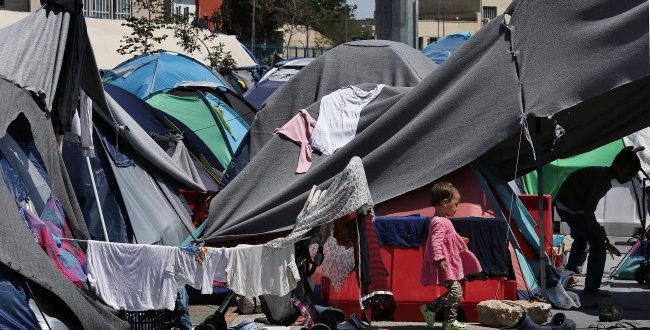European Union countries that refuse to accept refugees under new asylum plans face $285,000 fines in “solidarity contributions” for each asylum-seeker rejected, under new rules announced by the European Commission.
The EU on Wednesday published legislative proposals to reform the so-called Dublin system of asylum rules, including a “fairness mechanism” which would see the introduction of a quota system, with each of the 28 states assigned a percentage of asylum seekers.
The quotas would reflect national population and wealth and, if a country found itself handling 50 per cent more than its due share, it could relocate people elsewhere in the bloc.
States could refuse to take people for a year – but only if they paid another country 250,000 euros ($A384,083) per person to accommodate them.
“There is no a la carte solidarity in this Union,” First Vice President Frans Timmermans said.
“This is a way to be able to show solidarity in a situation where … you are not able to take the refugees which were allocated to you.”
But at a meeting in Prague, ministers from Poland, Hungary and the Czech Republic all repeated their opposition to the idea of relocation, saying it violates their rights and amounted to blackmail.
A two-year emergency relocation scheme was set up last year as Greece struggled to cope with the chaotic arrival of nearly a million people, many of them Syrian refugees, most of whom reached Germany.
In fact, only 1441 asylum seekers have been relocated out of the 160,000 allowed for under the current temporary scheme.
The proposals need backing from governments and the European Parliament – a process that officials expect to be an uphill battle.
Germany, the bloc’s main paymaster and destination for the bulk of migrants, is pushing hard for a permanent relocation system and is frustrated with the refusal of governments in the east who benefit the most from EU subsidies to take in asylum seekers.
Poland, Hungary and other formerly communist states say immigration, especially from the Muslim cultures of the Middle East, disrupts their homogeneous societies.
Governments also object to paying as an alternative to taking people in.
Any reform of the system, from which Britain, Ireland and Denmark are exempt, will require majority approval by EU governments.
Division over migration is one of the biggest challenges the EU faces and the ongoing debate has lead to a rise in European nationalist parties.
Chaotic movements of migrants, including many heading north through Italy and Greece without being registered, has thrown the bloc’s cherished Schengen system of open borders into disarray, with governments putting up new barriers to travel.
EU officials hope a new deal with Turkey, from where the bulk of 1.3 million people reached Europe last year, will stem the flow and allow the EU to regain control and restore order in the Schengen area.
Also on Wednesday, Brussels is expected to confirm a lifting of visa restrictions on Turks as part of the deal.
The EU is offering to take in refugees directly from Turkey, which hosts 2.7 million Syrians, in exchange for Ankara trying to stem the flow of departures.
Agencies/Canadajournal
 Canada Journal – News of the World Articles and videos to bring you the biggest Canadian news stories from across the country every day
Canada Journal – News of the World Articles and videos to bring you the biggest Canadian news stories from across the country every day



